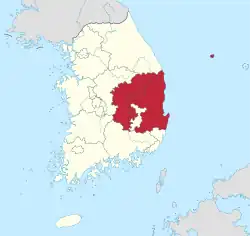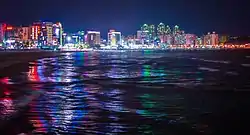North Gyeongsang Province
경상북도 | |
|---|---|
| Korean transcription(s) | |
| • Hangul | 경상북도 |
| • Hanja | 慶尙北道 |
| • McCune‑Reischauer | Kyŏngsang-bukto |
| • Revised Romanization | Gyeongsangbuk-do |
 Flag  Logo | |
 | |
| Country | |
| Region | Yeongnam |
| Largest city | Pohang |
| Capital | Andong |
| Subdivisions | 10 cities; 12 counties |
| Government | |
| • Governor | Lee Cheol-woo (People Power) |
| Area | |
| • Total | 19,030 km2 (7,350 sq mi) |
| • Rank | 1st |
| Population (October, 2014)[1] | |
| • Total | 2,700,328 |
| • Rank | 3rd |
| • Density | 141.7/km2 (367/sq mi) |
| Demonym | Gyeongbukite |
| Metropolitan Symbols | |
| • Flower | Crape-myrtle |
| • Tree | Zelcova |
| • Bird | Common heron |
| GDP | |
| • Total | KR₩ 115 trillion US$ 92 billion (2022) |
| ISO 3166 code | KR-47 |
| Dialect | Gyeongsang |
| Website | Official website (English) |
North Gyeongsang Province (Korean: 경상북도, romanized: Gyeongsangbuk-do, Korean pronunciation: [kjʌŋ.saŋ.buk̚.t͈o]) is a province in eastern South Korea, and with an area of 19,030 km2 (7,350 sq mi), it is the largest province in the Korean peninsula. The province was formed in 1896 from the northern half of the former Gyeongsang province, and remained a province of Korea (as Keishōhoku-dō during Japanese rule) until the country's division in 1945, then became part of South Korea.
Daegu was the capital of North Gyeongsang Province between 1896 and 1981, but has not been a part of the province since 1981. In 2016, the provincial capital moved from Daegu to Andong.[3]
Geography and climate
The province is part of the Yeongnam region, bordered to the south by South Gyeongsang Province, to the west by North Jeolla and North Chungcheong Provinces, and to the north by Gangwon Province. It is largely surrounded by mountains: the Taebaek Mountains in the east and the Sobaek Mountains in the west.
Culture
North Gyeongsang Province is the homeland of the former kingdom of Silla and has retained much of its cultural tradition. A number of artists, political leaders and scholars have come from the province.
 View of Hahoe Folkvillage in Andong
View of Hahoe Folkvillage in Andong View of Yangdong Folk Village in Gyeongju
View of Yangdong Folk Village in Gyeongju View of Muryangsojieon lantern statue and Buseoksa Temple in Yeongju
View of Muryangsojieon lantern statue and Buseoksa Temple in Yeongju.jpg.webp) Bulguk Temple in Gyeongju
Bulguk Temple in Gyeongju
Demographics
| Year | Pop. | ±% p.a. |
|---|---|---|
| 1980 | 3,102,060 | — |
| 1990 | 2,766,797 | −1.14% |
| 2000 | 2,724,931 | −0.15% |
| 2010 | 2,600,032 | −0.47% |
| 2015 | 2,680,294 | +0.61% |
| 2020 | 2,644,757 | −0.27% |
| Source: Citypopulation[4] | ||
Religion
According to the census of 2015, 25.3% followed Buddhism and 18.5% followed Christianity (13.3% Protestantism and 5.2% Catholicism). 55.4% of the population is irreligious.[5]
Administrative divisions
Gyeongsangbuk-do is divided into 10 cities (si) and 12 counties (gun). The names below are given in English, hangul, and hanja. Gyeongsang do is originated from Gyeongju & Sangju old city of Gyeong+Sang from Joseon Dynasty (1392-1910). Do means road to 8 directional road from Seoul. Pohang is Korean steel production hub, Gumi is electronics capital of South Korea.

| Map | # | Name | Hangul | Hanja | Population (2013)[6] | Subdivisions |
|---|---|---|---|---|---|---|
 | ||||||
| — Specific City — | ||||||
| 1 | Pohang | 포항시 | 浦項市 | 519,060 | 2 ilban-gu — 4 eup, 10 myeon, 15 haengjeong-dong | |
| — City — | ||||||
| 2 | Gumi | 구미시 | 龜尾市 | 417,708 | 2 eup, 6 myeon, 19 haengjeong-dong | |
| 3 | Gyeongsan | 경산시 | 慶山市 | 247,613 | 2 eup, 6 myeon, 7 haengjeong-dong | |
| 4 | Gyeongju | 경주시 | 慶州市 | 263,704 | 4 eup, 8 myeon, 11 haengjeong-dong | |
| 5 | Andong | 안동시 | 安東市 | 167,826 | 1 eup, 13 myeon, 10 haengjeong-dong | |
| 6 | Gimcheon | 김천시 | 金泉市 | 135,191 | 1 eup, 14 myeon, 7 haengjeong-dong | |
| 7 | Yeongju | 영주시 | 榮州市 | 112,482 | 1 eup, 9 myeon, 9 haengjeong-dong | |
| 8 | Sangju | 상주시 | 尙州市 | 103,950 | 1 eup, 17 myeon, 6 haengjeong-dong | |
| 9 | Yeongcheon | 영천시 | 永川市 | 101,295 | 1 eup, 10 myeon, 5 haengjeong-dong | |
| 10 | Mungyeong | 문경시 | 聞慶市 | 75,749 | 2 eup, 7 myeon, 5 haengjeong-dong | |
| — County — | ||||||
| 11 | Chilgok County | 칠곡군 | 漆谷郡 | 120,135 | 3 eup, 5 myeon | |
| 12 | Uiseong County | 의성군 | 義城郡 | 56,777 | 1 eup, 17 myeon | |
| 13 | Uljin County | 울진군 | 蔚珍郡 | 51,723 | 2 eup, 8 myeon | |
| 14 | Yecheon County | 예천군 | 醴泉郡 | 45,948 | 1 eup, 11 myeon | |
| 15 | Cheongdo County | 청도군 | 淸道郡 | 43,787 | 2 eup, 7 myeon | |
| 16 | Seongju County | 성주군 | 星州郡 | 44,824 | 1 eup, 9 myeon | |
| 17 | Yeongdeok County | 영덕군 | 盈德郡 | 40,213 | 1 eup, 8 myeon | |
| 18 | Goryeong County | 고령군 | 高靈郡 | 35,281 | 1 eup, 7 myeon | |
| 19 | Bonghwa County | 봉화군 | 奉化郡 | 33,936 | 1 eup, 9 myeon | |
| 20 | Cheongsong County | 청송군 | 靑松郡 | 26,432 | 1 eup, 7 myeon | |
| 21 | Yeongyang County | 영양군 | 英陽郡 | 18,259 | 1 eup, 5 myeon | |
| 22 | Ulleung County | 울릉군 | 鬱陵郡 | 10,557 | 1 eup, 2 myeon | |
Recent discoveries
In September 2021, archaeologists announced the discovery of 1500 years-old woman skeleton with a necklace and a bracelet in North Gyeongsang Province. The remains of a 135-centimeter-tall woman, who is estimated to have died in her 20s, were discovered along with the bones of animals such as horses and cows, as well as earthenware.[7][8][9][10]
See also
References
- ↑ "연령별 인구현황". Archived from the original on 29 November 2014. Retrieved 1 October 2015.
- ↑ "2022년 지역소득(잠정)". www.kostat.go.kr.
- ↑ 도로망 구축 10조 원, 경북도청 신청사 지역의 위용(사진). HuffPost (in Korean). 15 February 2016. Retrieved 23 February 2016.
- ↑ "South Korea: Provinces".
- 1 2 "2015 Census – Religion Results" (in Korean). KOSIS KOrean Statistical Information Service. Retrieved 10 March 2021.
- ↑ 2013년 1분기 주민등록인구현황 (in Korean). North Gyeongsang Province. March 2013. Retrieved 10 June 2013.
- ↑ "More human sacrifice evidence unearthed at Gyeongju palace site". koreatimes. 7 September 2021. Retrieved 11 September 2021.
- ↑ "Human Remains Found in Foundation of Silla Dynasty Palace - Archaeology Magazine". www.archaeology.org. Retrieved 11 September 2021.
- ↑ Seung-hyun, Song (7 September 2021). "More evidence unearthed of Silla-era human sacrifice". The Korea Herald. Retrieved 11 September 2021.
- ↑ "Remains from human sacrifices unearthed at Wolseong Palace in Gyeongju". english.hani.co.kr. Retrieved 11 September 2021.
External links
- Official website (in English)
- (in French) Alsace/Gyeongsangbuk-do
 North Gyeongsang Province travel guide from Wikivoyage
North Gyeongsang Province travel guide from Wikivoyage
